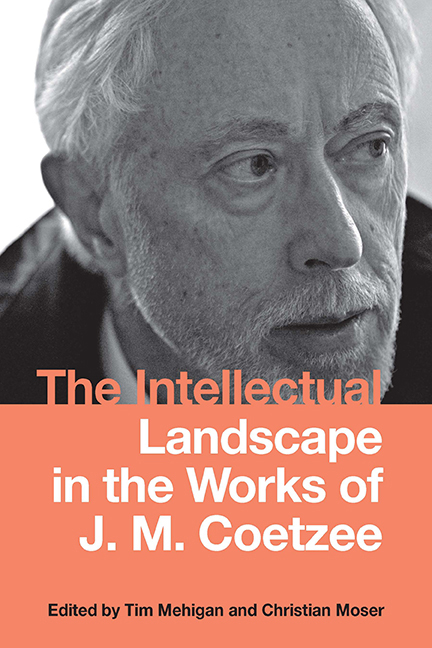Book contents
- Frontmatter
- Contents
- Acknowledgments
- Introduction: Coetzee's Intellectual Landscapes
- Part I Truth and Justification
- 1 J. M. Coetzee on Truth, Skepticism, and Secular Confession in “The Age We Live In”
- 2 Social Order and Transcendence: J. M. Coetzee's Poetics of Play
- 3 Autobiography and Romantic Irony: J. M. Coetzee and Roland Barthes
- 4 The Semantics of Barbarism in J. M. Coetzee's Novel Waiting for the Barbarians
- 5 In the Heart of the Empire: Coetzee and America
- Part II Objectivity and Communication
- Part III Convergence of Interpretative Horizons and Moral Solidarity
- Notes on the Contributors
- Index
4 - The Semantics of Barbarism in J. M. Coetzee's Novel Waiting for the Barbarians
from Part I - Truth and Justification
Published online by Cambridge University Press: 03 July 2019
- Frontmatter
- Contents
- Acknowledgments
- Introduction: Coetzee's Intellectual Landscapes
- Part I Truth and Justification
- 1 J. M. Coetzee on Truth, Skepticism, and Secular Confession in “The Age We Live In”
- 2 Social Order and Transcendence: J. M. Coetzee's Poetics of Play
- 3 Autobiography and Romantic Irony: J. M. Coetzee and Roland Barthes
- 4 The Semantics of Barbarism in J. M. Coetzee's Novel Waiting for the Barbarians
- 5 In the Heart of the Empire: Coetzee and America
- Part II Objectivity and Communication
- Part III Convergence of Interpretative Horizons and Moral Solidarity
- Notes on the Contributors
- Index
Summary
Introductory Remarks
EVER SINCE BÁRBAROS acquired its ethnocentric meaning in the fifth century BC, this Greek noun and adjective and its derivatives in Latin and in the modern European languages have functioned as an “asymmetric counter-concept” (asymmetrischer Gegenbegriff), to quote the historian Reinhart Koselleck. Discriminating against the ethnic others to whom the concept is applied, it functions to deny the reciprocity of mutual recognition. It involves, as Edward Said has put it, a hierarchical spatial divide between a metropolitan center and remote territories to be controlled or even colonized by the center. Thus the concept generates a dynamic of forcing the indigenous inhabitants of those territories to mimic the center's view of them as subhuman beings whose domination and even annihilation may seem legitimate. This violent dynamic inherent in the concept must undermine and ultimately reverse the positions held by the asymmetric counter-concept and its opposite, as Claude Lévi-Strauss has pointed out very pertinently in his 1952 UNESCO memorandum entitled Race et Histoire: “Le barbare, c'est d'abord l'homme qui croit à la barbarie” (The barbarian is first of all the very person who believes in barbarism).
Despite this dynamic of reversal, the space-related, exclusionary function of the concept has prevailed for about two and a half thousand years. It has resisted the Enlightenment's attempt to temporalize the concept (an attempt quoted in Coetzee's novel, as we will see). This stunning resistance and resilience bears witness to the important role that the use of the word barbarian as an asymmetric counter-concept has played and continues to play in European and Western cultural history and identity formation. We may even surmise that it is a founding concept, or rather a founding counter-concept, of European and Western identity. Yet there is much reluctance to acknowledge it as such. This is evidenced by the fact that there is still no comprehensive history of the concept ranging from classical antiquity to the present.
One of the scholarly reasons for this dearth of research no doubt is that the concept of the barbarian defies the traditional methodology of conceptual history. The latter focuses almost exclusively on non-fictional and non-poetic texts, and while admitting that there are no concepts without words, it considers that concepts can to a large extent be abstracted from the words representing them, since these words are variable over time and (linguistic) space.
- Type
- Chapter
- Information
- The Intellectual Landscape in the Works of J. M. Coetzee , pp. 87 - 108Publisher: Boydell & BrewerPrint publication year: 2018



